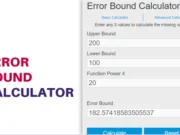What is a Factor Calculator?
A Factor Calculator is a tool that allows users to determine the factors of a given number. It provides various outputs, including the factors, factor pairs, and prime factors of the input number. This calculator aids in understanding divisibility and factorization, which are crucial concepts in mathematics. By inputting a number, users can quickly access a list of factors and pairs, making it an invaluable resource for students, educators, and math enthusiasts.
What is a Factor?
A factor is a number that divides another number without leaving a remainder. Factors are integral parts of mathematics, useful in various fields such as arithmetic, algebra, and number theory. For any integer, factors are always less than or equal to the number itself. For example, the factors of 12 are 1, 2, 3, 4, 6, and 12. Identifying factors is fundamental in simplifying fractions, finding least common multiples, and working with divisibility rules.
How to use the Factor Calculator?
To use the Factor Calculator, simply enter a whole number into the provided input box and click the "Calculate" button. The calculator will then compute the factors, factor pairs, and prime factors of the number. After the results are displayed, you can read through the detailed explanation of the calculations. If you wish to clear the input and results, click the "Clear" button. This user-friendly interface makes it easy for anyone to understand and utilize.
Results
| Formula | |
|---|---|
| Result | |
| Factors | |
| Factor Pairs | |
| Prime Factors |
Step-by-Step Solution:
FAQs
1. What are prime factors?
Prime factors are the factors of a number that are prime numbers. A prime number is defined as a natural number greater than 1 that cannot be formed by multiplying two smaller natural numbers. For example, the prime factors of 12 are 2 and 3 because 12 = 2 x 2 x 3. Identifying prime factors is essential in various mathematical computations, including finding the greatest common divisor and least common multiple.
2. Why are factors important?
Factors are vital in various mathematical operations, including simplification of fractions, finding common denominators, and solving algebraic equations. Understanding factors also helps in number theory, enabling students and professionals to break down complex numbers into manageable parts, which can lead to easier calculations and solutions in more advanced mathematical contexts.
3. Can all numbers be factored?
Yes, all whole numbers greater than zero can be factored into integers, including 1 and itself. The number 1 has only one factor, which is itself, and prime numbers have exactly two factors: 1 and the number itself. Non-integer numbers and zero cannot be factored in the same way as whole numbers.
4. How do I find the factors of a number manually?
To find the factors of a number manually, start by dividing the number by integers from 1 up to the number itself. If the division results in a whole number without a remainder, both the divisor and quotient are factors. For example, to find factors of 12, check divisions like 12 ÷ 1 = 12, 12 ÷ 2 = 6, etc., identifying factors as 1, 2, 3, 4, 6, and 12.
5. What is a factor pair?
A factor pair consists of two numbers that, when multiplied together, produce a specific product. For example, for the number 12, one factor pair is (3, 4) because 3 x 4 = 12. Identifying factor pairs can aid in solving equations and simplifying problems in various areas of mathematics, particularly in algebra and geometry.
6. Are factors always smaller than the number?
Yes, all factors of a number are less than or equal to that number. The number itself and 1 are always factors of any integer. The largest factor, besides the number itself, is the number divided by its smallest prime factor, which is always less than the number, confirming that factors fall within that range.
7. What is the relationship between factors and multiples?
Factors and multiples are opposites in mathematical terms. Factors are numbers that divide another number evenly, while multiples are the results of multiplying a number by an integer. For instance, 12 has factors of 1, 2, 3, 4, 6, and 12, while its multiples include 12, 24, 36, and so on. Understanding both concepts is crucial for various arithmetic and algebraic operations.
8. Can a number have an odd number of factors?
Yes, a number can have an odd number of factors if it is a perfect square. This occurs because one of the factors is repeated (the square root of the number). For example, the number 36 has factors 1, 2, 3, 4, 6, 9, 12, 18, and 36, totaling nine factors, which is odd. Non-square numbers will always have an even number of factors.
9. What is a composite number?
A composite number is a natural number greater than 1 that is not prime; it has more than two distinct factors. For instance, 12 is composite because its factors are 1, 2, 3, 4, 6, and 12. Composite numbers can be divided evenly by numbers other than 1 and themselves, making them crucial in number theory and arithmetic.
10. How does the calculator determine prime factors?
The calculator identifies prime factors by testing each integer from 2 up to the square root of the given number. It checks for divisibility and, if a divisor is found, continues dividing the quotient until only prime numbers remain. This systematic approach ensures all prime factors are identified accurately, providing a comprehensive factor analysis for users.
11. How can I verify the factors of a number?
You can verify the factors of a number by multiplying each pair of identified factors to see if they produce the original number. Additionally, you can check for divisibility by testing each potential factor using division. If a division results in a whole number, that factor is confirmed. This verification process helps ensure the accuracy of factorization.
12. What is the importance of finding factors in real-life applications?
Finding factors is crucial in various real-life applications, such as optimizing resources, problem-solving in construction, and analyzing patterns in data. Understanding factors aids in making informed decisions in budgeting, scheduling, and organizing tasks, demonstrating the practical relevance of mathematical concepts in daily life and professional settings.
Related Calculator-












